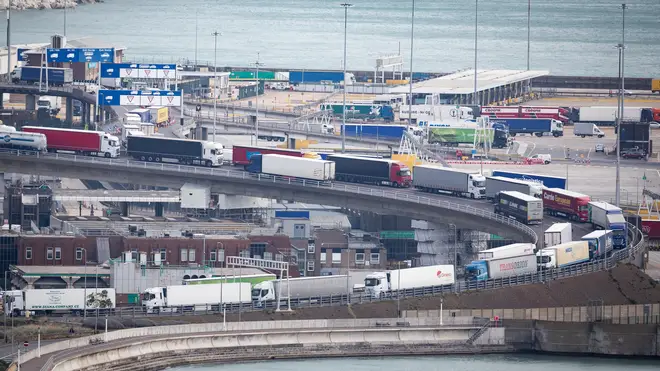
Simon Marks 3pm - 7pm
1 December 2020, 00:18 | Updated: 1 December 2020, 00:20

The UK has launched a new 24/7 unit to monitor border disruption for when the Brexit transition period comes to an end at midnight on 31 December.
To help businesses, the government has set up a round-the-clock Border Operations Centre (BOC) that it says will use "cutting-edge software" to monitor Britain's border in "real-time".
It will give officials a complete view of goods and passengers entering and exiting ports, with hopes it will give the country "the world's most effective border by 2025".
The operation will include a Border Flow Service that gathers information about the flow of goods and passengers.
Michael Gove and Alok Sharma have urged firms to act now ahead of changes in the way the UK trades with the European Union coming into effect in a month's time when Britain leaves the single market and customs union on 1 January.
However, ministers conceded that the upcoming changes to how the UK trades with the EU "will likely mean that there is short term disruption at the border".
Read more: Brexit border control tests cause Kent motorway chaos
Watch: 'UK could face No Deal this year as deadline looms,' admits Eustice

George Eustice says Brexit trade deal must be sorted this week
It comes as trade talks continue in London between Europe's Michel Barnier and his UK counterpart Lord Frost, with both sides acknowledging time is running short if they are to reach an agreement.
The UK government claimed its new system will help goods and people move smoothly to and from the continent while making the country safer and more secure.
From July, anything imported from the EU will need a safety and security declaration, which ministers said will help in tackling organised crime at the border.
Chancellor of the Duchy of Lancaster Michael Gove said the BOC "will help us tackle challenges quickly and decisively, and give us increased information which will make us safer and more secure".
In a message to businesses, Mr Gove said: "Regardless of the outcome of our negotiations with the EU, there are guaranteed changes that businesses must prepare for now.
"There is no time to lose, but by visiting gov.uk/transition you can quickly find out what actions you need to take.”
Read more: EU needs to show 'flexibility and pragmatism' to get deal - Raab
Watch: No-deal will be more damaging to economy than Covid - ex-Chancellor

Nick Ferrari asks Chancellor impact of No Deal Brexit
Business Secretary Alok Sharma said: “Our fresh start outside of the EU single market and customs union is just on the horizon.
“As we enter the home stretch, businesses must make sure they are fully prepared for the new rules and opportunities that being an independent trading nation will bring.
“Amongst all our proactive work with business, I have written to nearly five million firms across the UK outlining the top actions they need to take, and reminding them that the government is here to support them as the transition period ends”.
However, Labour’s shadow Cabinet Office minister Rachel Reeves accused the government of shirking responsibility and putting the burden on businesses in terms of preparing for the end of the transition period.

James O'Brien on Brexit trade deals
The Leeds West MP said: “Once again, this government is putting the burden on businesses to prepare for the end of the transition period when it has not explained what it is those businesses are getting ready for.
"Is it for tariffs or no tariffs with the EU?
“The government is rebadging a basic element of preparation but still can't tell us how many customs agents are recruited or trained or whether crucial IT is ready.
“With glaring questions like these still unanswered, this government must do much more than just 'demand action' from UK businesses, already under huge pressure from the pandemic – and instead provide them with some much-needed answers.”
To prepare businesses for the impact of Brexit, the government has set up a Brexit Business Taskforce which meets every week, published guidance for hauliers and invested in jobs, infrastructure and technology at the border.